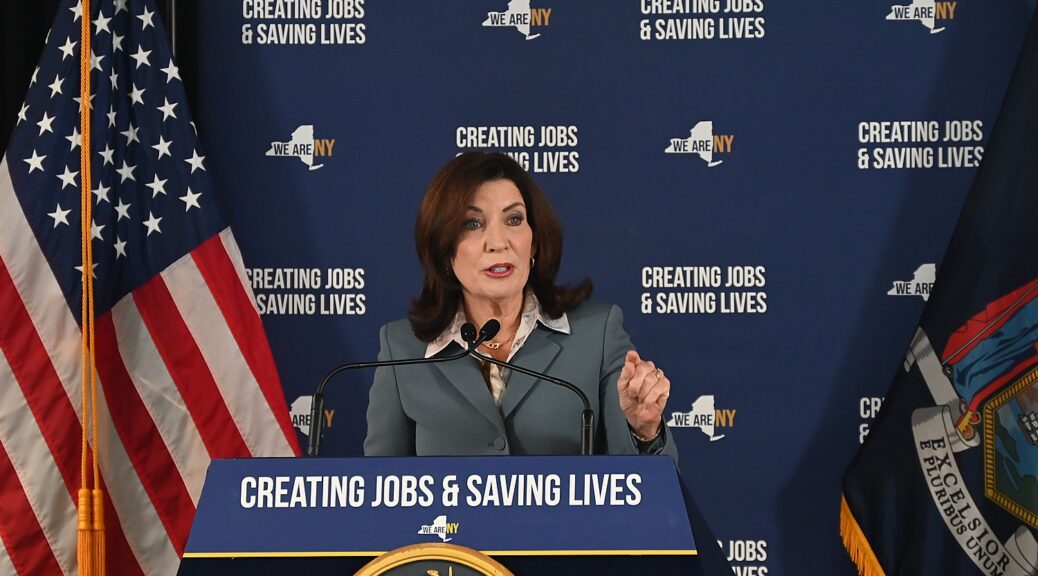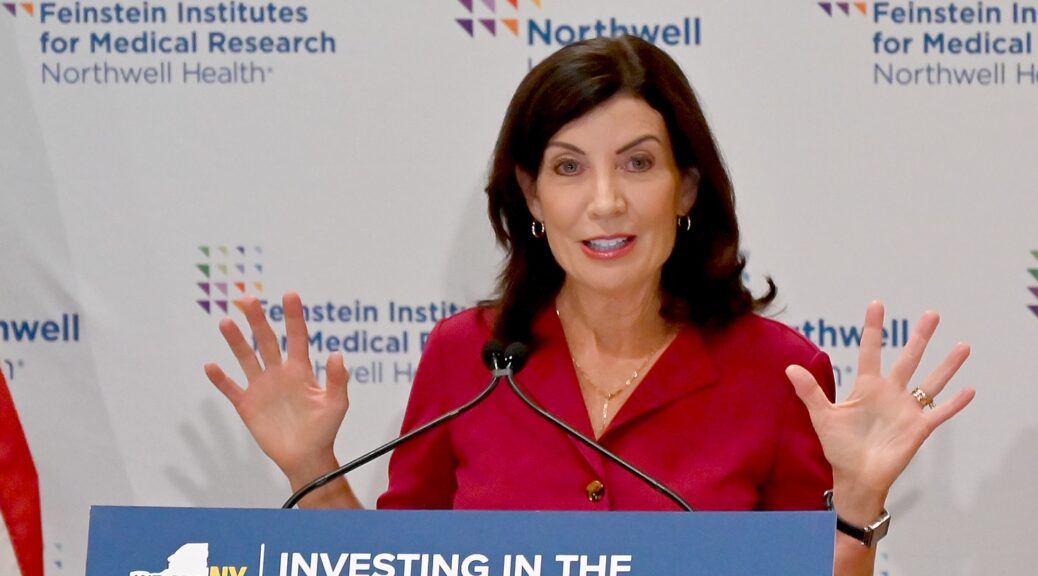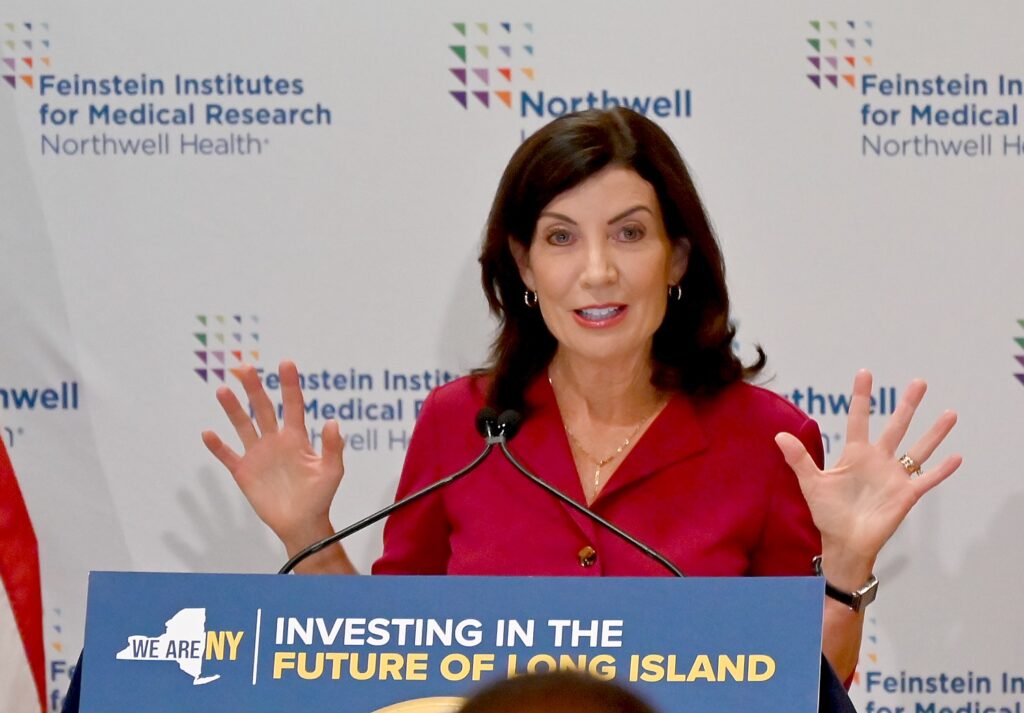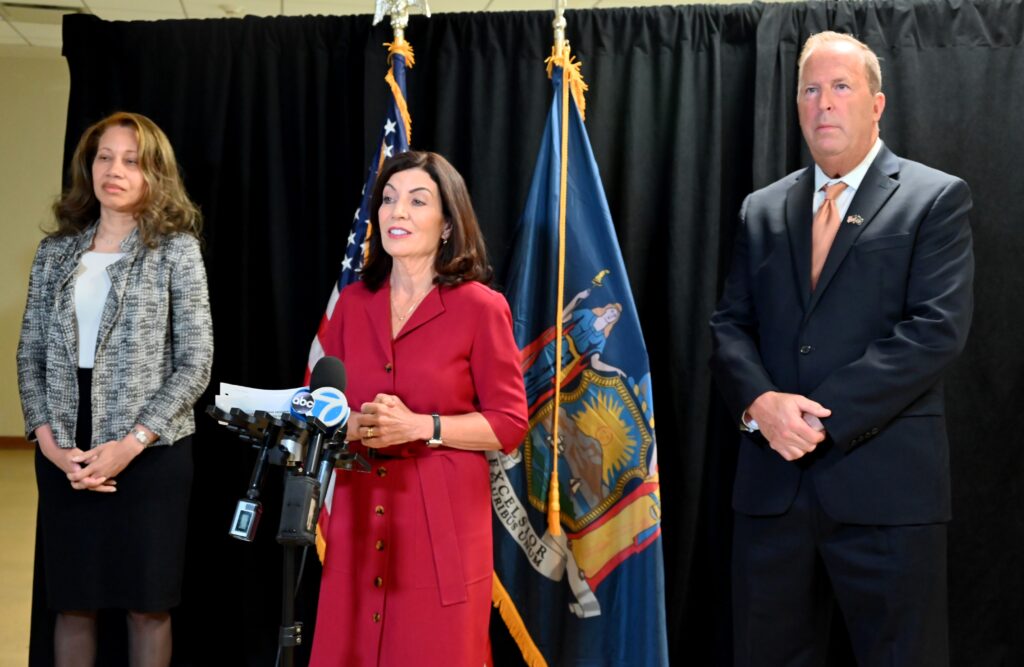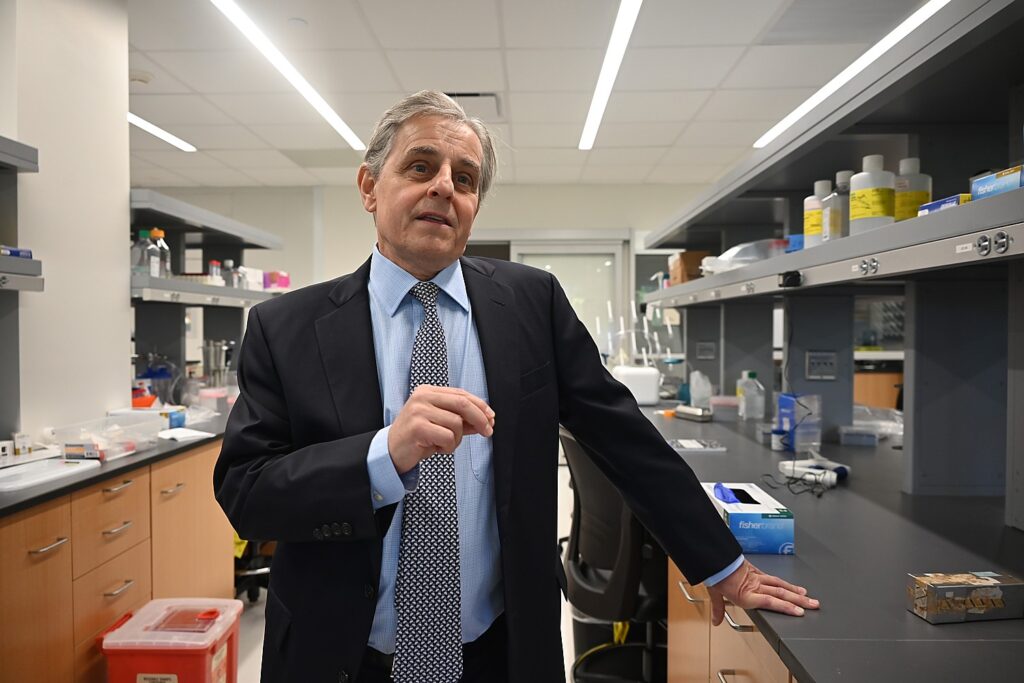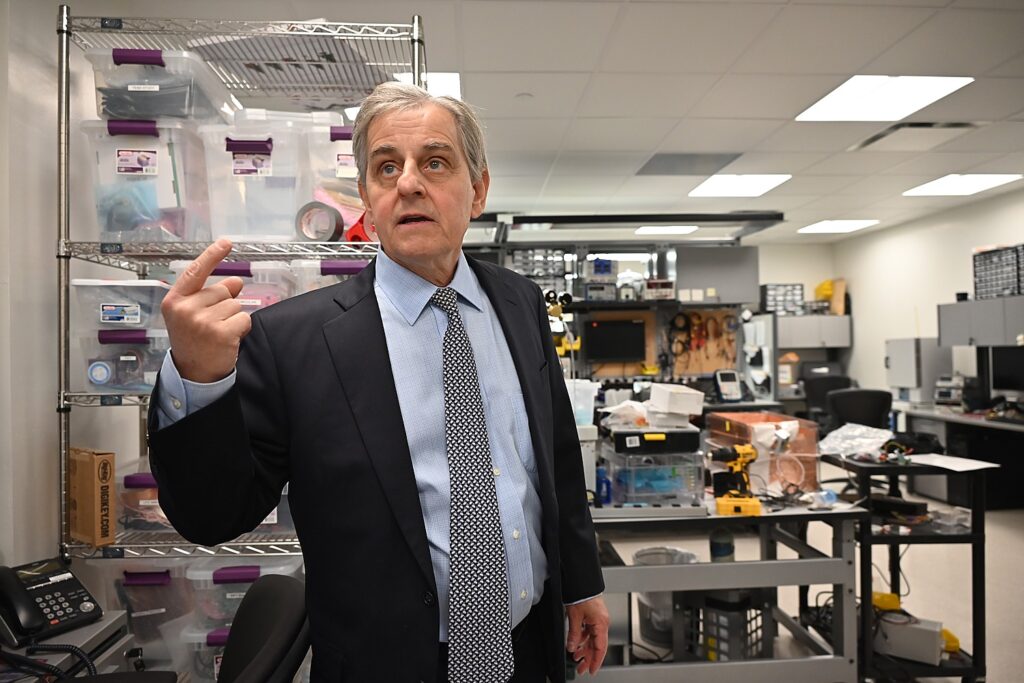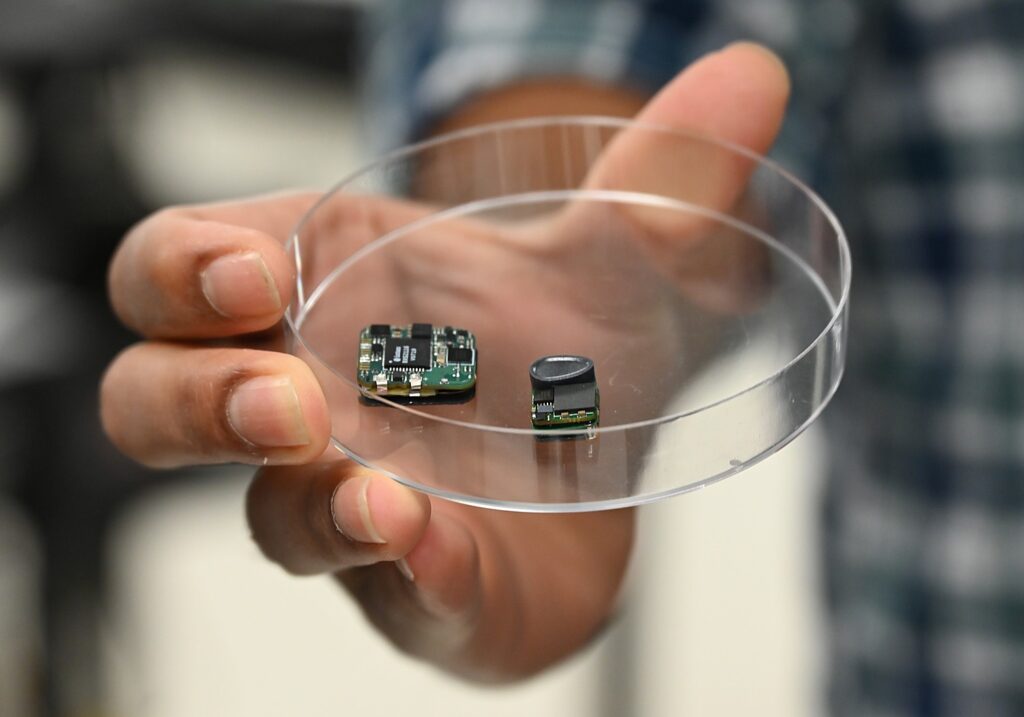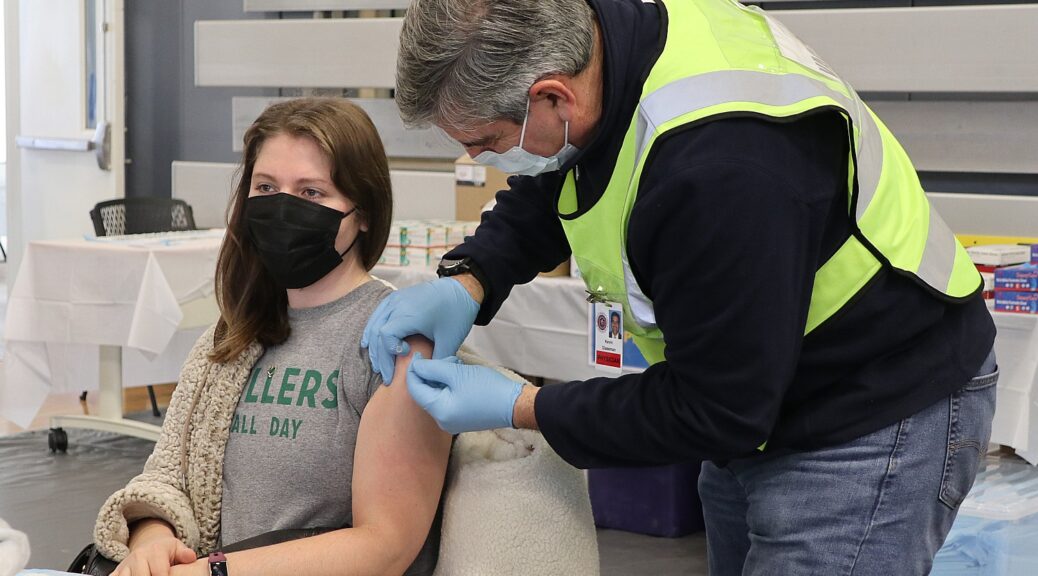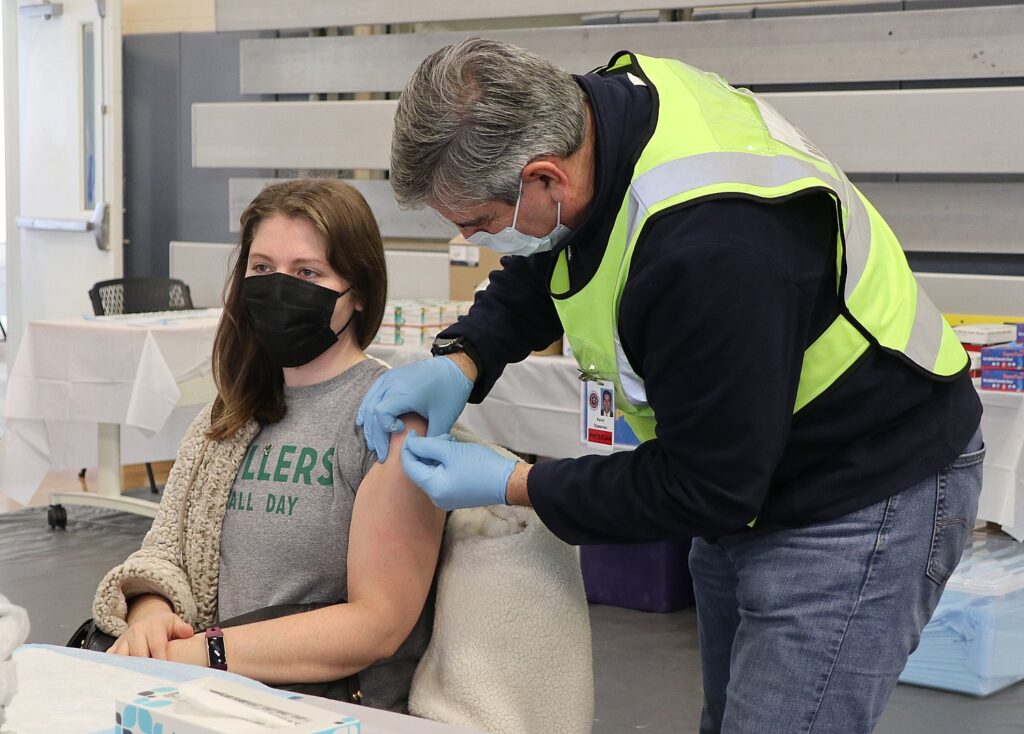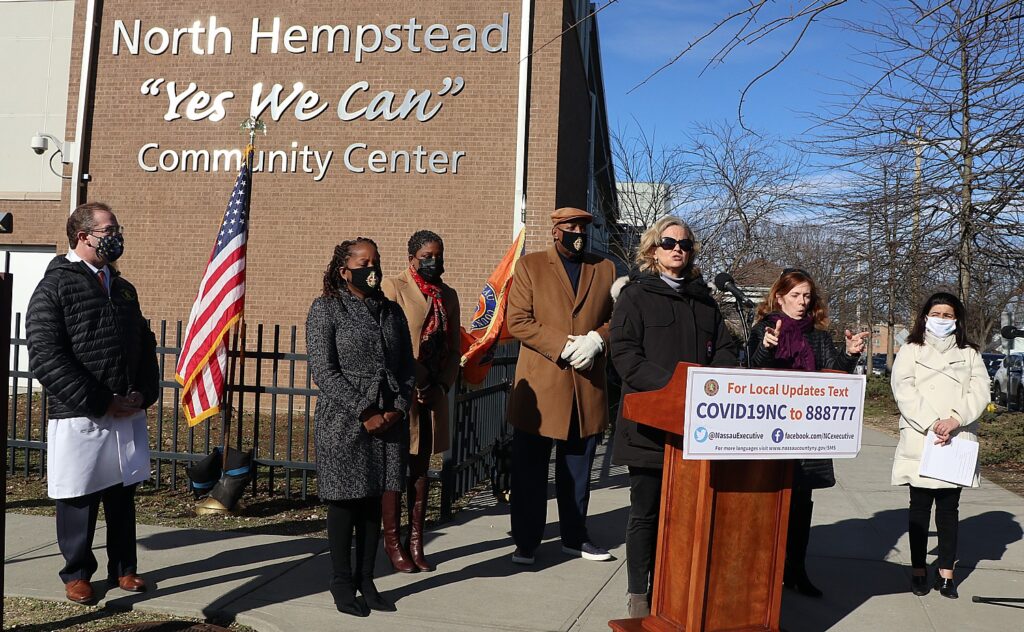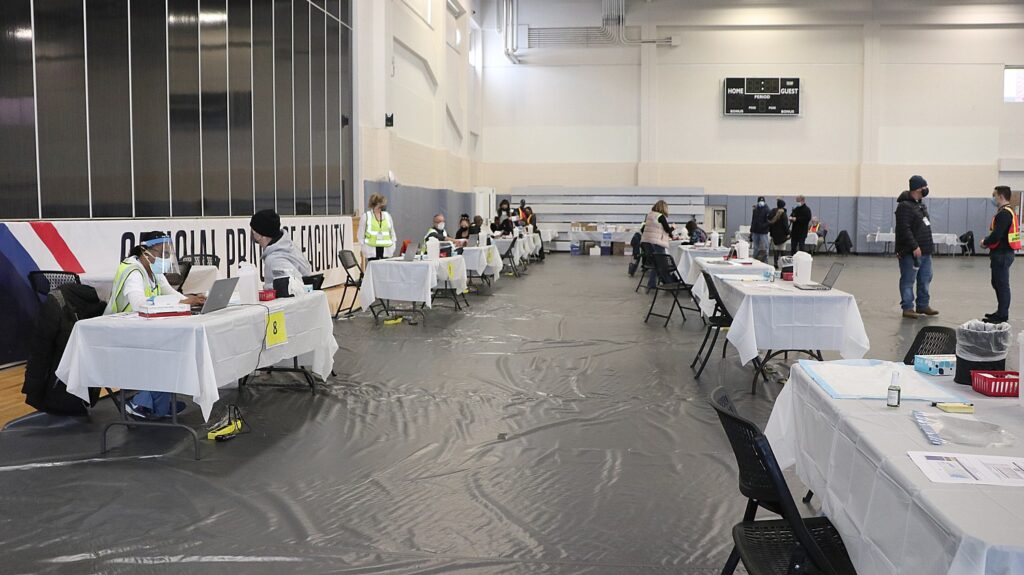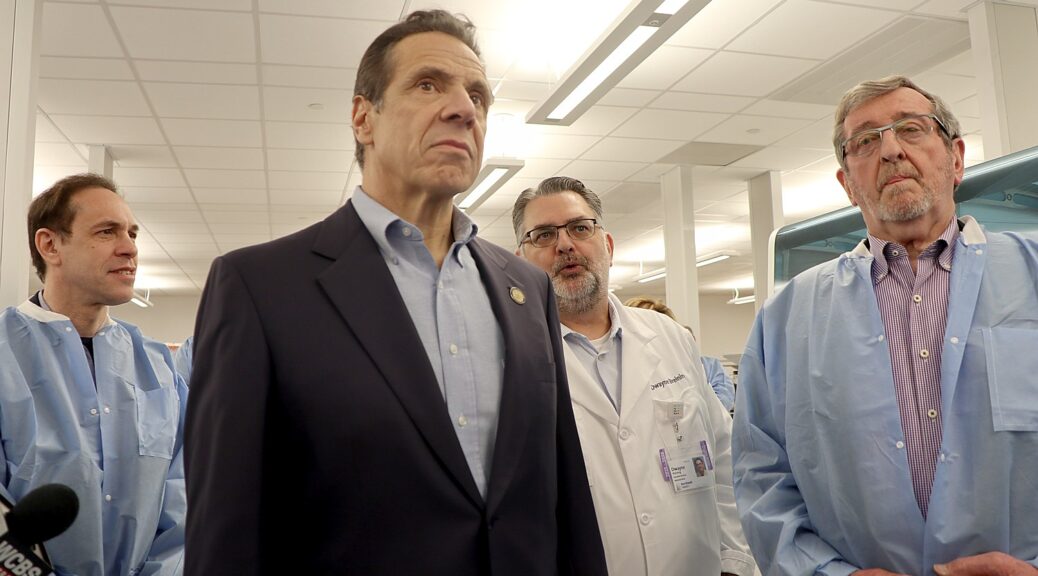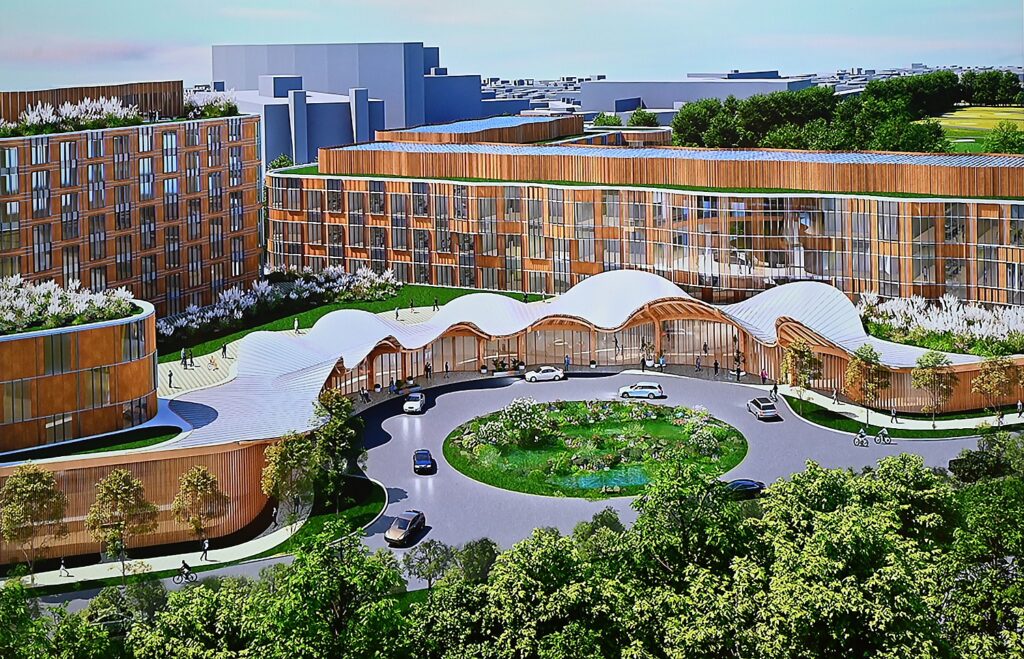
By Karen Rubin, News-Photos-Features.com, editor@news-photos-features.com
Long Island will soon become the epicenter for some of the most important medical breakthroughs in the world, with the opening of New York BioGenesis Park, a Cell and Gene Therapy Innovation Hub.
New York Governor Kathy Hochul unveiled the plans for the state-of-the-art facility, to be developed by The Albanese Organization, Inc., to catalyze CGT research, development, clinical manufacturing, and commercialization across New York State. With a historic $150 million state investment—the largest nationwide for a cell and gene therapy hub—NYBGP would accelerate the delivery of new therapies from lab to patient in New York’s diverse communities. This transformative hub aims to establish New York as the leading global destination for CGT innovation, driving economic growth, attracting top talent, and revolutionizing patient care statewide and beyond.
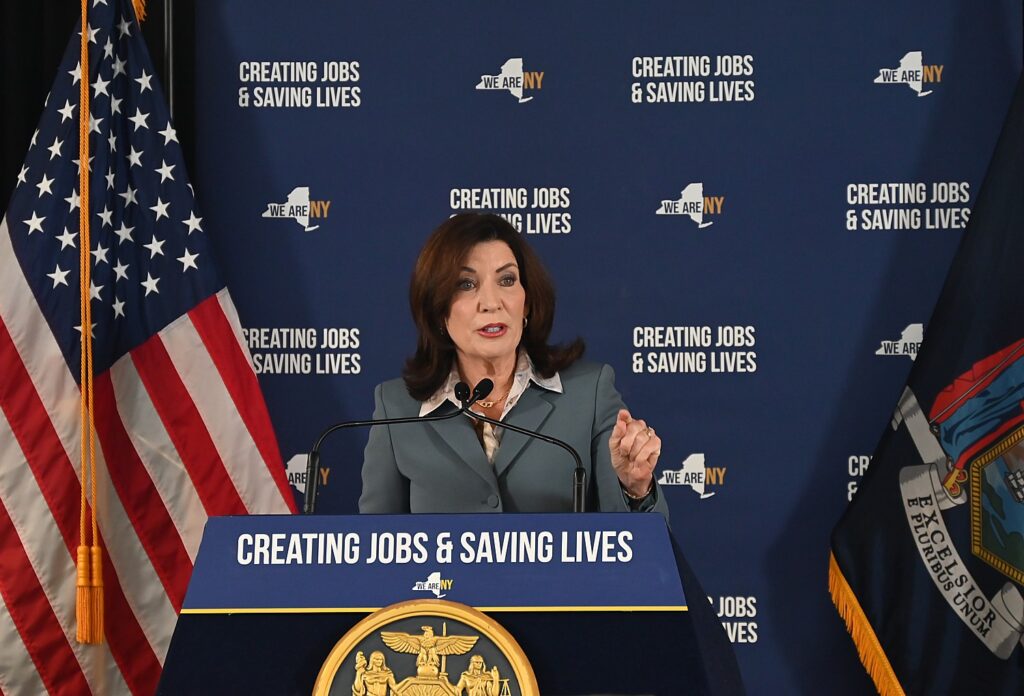
“With this groundbreaking hub, New York has the opportunity to stake its claim as the epicenter of cell and gene therapy innovation,”Governor Hochul said. “We’re not just advancing medical science; we’re creating a powerhouse that will drive our economy, generate thousands of high-skilled jobs, and bring hope to millions facing life-threatening diseases. This investment reaffirms our commitment to leading the future of healthcare and ensuring that the next medical breakthrough happens right here in New York.”
Cell and gene therapies are revolutionary treatments that modify a patient’s cells or genes to combat diseases at their source. Offering hope for previously incurable conditions—including cancers, genetic disorders, and autoimmune diseases—these approaches target illnesses at the cellular and genetic levels. They have the potential to provide more effective, longer-lasting treatments with fewer side effects than traditional methods. Advancements in these therapies could revolutionize healthcare, paving the way for personalized medicine and new possibilities for patients who have exhausted other treatment options.
“For people in the business, the healthcare professions of treating those who have complex diseases, this is an extraordinary opportunity,” Governor Hochul said. “And, cell and gene therapy, CGT, is one of the fastest growing treatment tools in the toolkit we have to deal with many, many diseases, and it’s near unlimited potential when it comes to changing outcomes for people diagnosed with cancer and rare diseases.”
With CGT, she said, cells are grown outside the body, genes are modified to eradicate harmful mutations, and then they’re fine-tuned by specialists in a lab, introduced into the patient where they go directly to work attacking cancerous cells and replacing faulty genes.
“It’s extraordinary when you think about that. Extraordinary. And, doctors call these therapies, not just miraculous, but a true paradigm shift. And their application is absolutely limitless. And, we think about the diseases that we’re trying to tackle. Those that have affected our own family members.”
Diseases that are considered incurable today: Parkinson’s, ALS, Multiple Sclerosis, heart disease, cancer, could be prevented, diagnosed, treated and cured using these technologies.
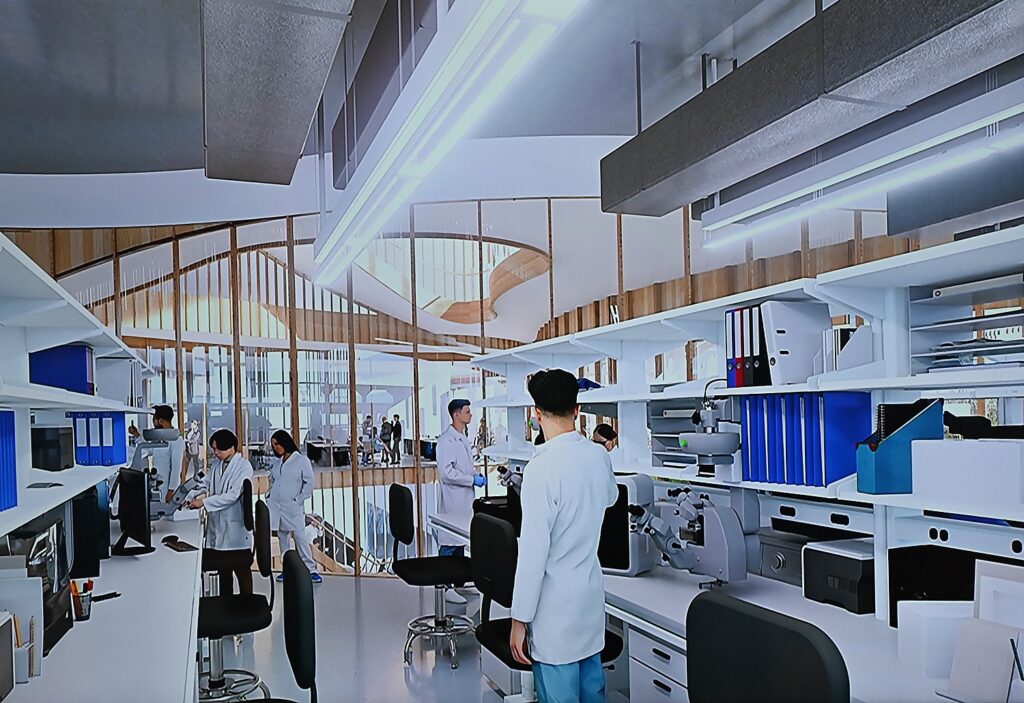
New York BioGenesis Park is envisioned as a cutting-edge, full-service campus dedicated to advancing cell and gene therapies and accelerating their commercialization. At full build-out, the 700,000-square-foot park would create an end-to-end Cell and Gene Therapy innovation and supply center, featuring interconnected areas for public engagement, research, manufacturing, and collaboration. The project would be developed in multiple phases, with Phase One comprising a 331,000-square-foot facility on Northwell Health’s campus in Lake Success, including the first Cell and Gene Therapy Tower and Contract Development and Manufacturing Organizations (CDMO) Tower. Phase One is already poised to advance, with conditional commitments from two anchor tenants; one would operate the CDMO, the other would operate the incubator.
A cornerstone of New York BioGenesis Park is its incubator, supported by a $50 million investment from ESD’s Long Island Investment Fund. This facility will empower early-stage therapeutic developers by offering state-of-the-art wet lab space, shared equipment, office space, and other essential resources. This nurturing environment would provide Cell and Gene Therapy companies with access to specialized equipment, mentoring, and stage-appropriate financial guidance. As a critical component of New York BioGenesis Park, the incubator is poised to catalyze the growth of promising Cell and Gene Therapy companies by providing them with resources and support, unlocking their potential for innovation and success.
This initial phase is expected to create approximately 830 full time union construction jobs and a combined estimate of 700 jobs related to Cell and Gene Therapy development and provision of services and technologies required by Cell and Gene Therapy developers, such as Contract Development and Manufacturing Organizations, vector developers, and advanced diagnostic providers, as well as staff required for operation of the Center. Phase Two would further expand lab and office space, enhancing the park’s capabilities for Cell and Gene Therapy companies and service providers.
Governor Hochul said that she expected the zoning and environmental studies to be completed by 2026 and the first phase – a 7,000 sq. ft. facility of what will ultimately be 330,000 sq. ft. to support research, development, education, and commercialization – to open by 2029. In the meantime, researchers are already at work in existing labs.
“New York BioGenesis Park represents a transformative investment in Long Island’s future and New York State’s position as a global leader in biotechnology advancements,” Empire State Development Board Chairman Kevin Law said. “This project not only promises to create hundreds of high-skilled jobs but also establishes a world-class ecosystem for cell and gene therapy innovation. By leveraging Long Island’s exceptional talent pool and research institutions, we’re laying the foundation for breakthroughs that will save lives and drive economic growth for decades to come.”
The state, through its Empire State Development office, is providing $150 million of the $430 million development cost, which will support 830 construction jobs and 700 full-time jobs – “as close as it gets to a sure bet,” Hochul said because CGT that this global market is going to go from $8.5 billion a year to over $21 billion a year, and projected to be worth over $120 billion in a few years.
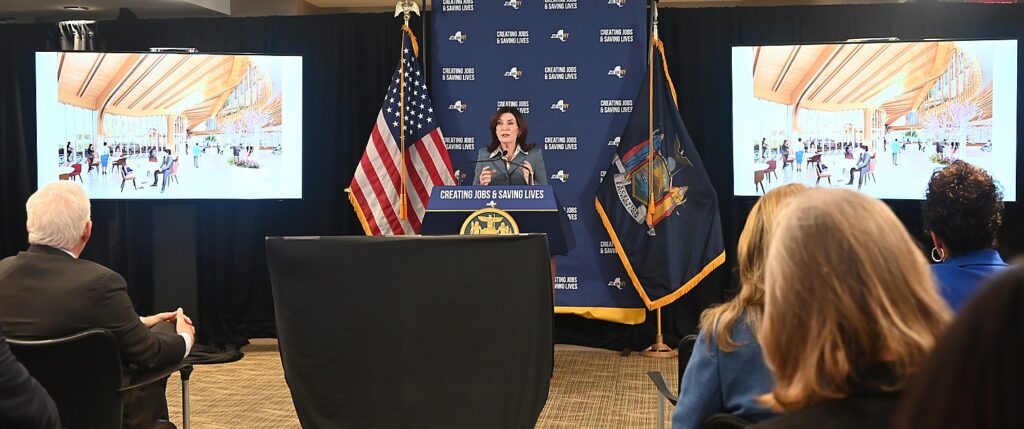
“We’ll be at the forefront of this movement with these investments today. So, I want to make sure that we know that Long Island, again, is at the forefront of this. This is a new, whole new market, a whole new opportunity for us and thousands of jobs being constructed here and beyond.”
Governor Hochul had designated Long Island as a hub for life sciences and technology innovation, climate and renewable energy. She noted that Long Island has the nation’s largest offshore wind facility that is commercial utility grade “and we’re just getting warmed up.” The state has designated Stony Brook University as one of two flagships.
All of this contributes to the sense of Long Island’s “exceptionalism, that there’s nothing holding us back because we have everything. We have the smartest people, the most incredible academic institutions. We have research.
“You think about what’s happening all over, every corner of this island. It is the place that people want to be who are inventing the future. And the future of healthcare is so much brighter now. The doctors, and researchers and the therapists who are coming here. And they’ll be building their lives here on Long Island. Now we need to build them some homes, but that’s another topic, okay? Let’s give them a place to live.
“And, we’re making progress there, and I want to continue to make this one of the most desirable places to live in all of New York, because it truly is. And having all these academic institutions and people coming here, young people coming here for an education, an opportunity to work in this innovative field, will then say, ‘I don’t have to go back to the home state I came from. I can stay right here and build a beautiful life’.”
“But what this technology gives, more than anything else, is hope to people whose lives are changed overnight with a diagnosis.
“You don’t have to be relegated to the same outcome you would have, but for these investments, but for this technology, but for this innovation. And, so, I do believe that New York state will become America’s premier CGT innovator, and I’m counting on it happening right here.”
“My friends, all of you who are involved with this, I honor you. This is one of the most impactful things we’ll do. In our time in these positions in elective office, and to all those in the medical profession who truly believe in this and the ones who are coming up with innovations and taking more time off the clock to get these products to market, to get them into people and help save their lives.
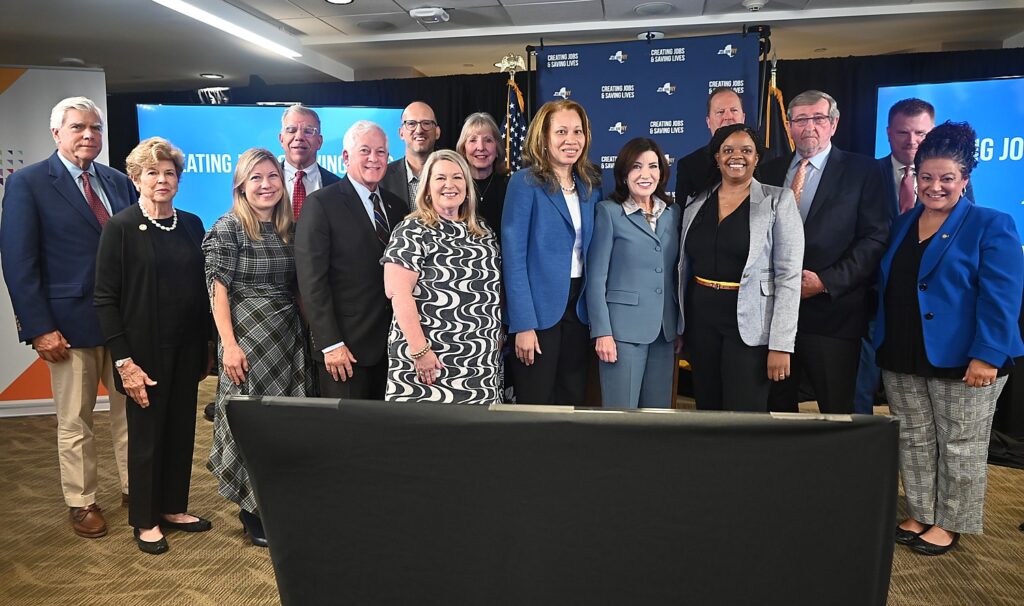
“So, we can’t control everything, but an opportunity here today to free people from a life of pain, uncertainty, and even death — that’s why we’re here today. That moral obligation we have to leave this place better than we found it. After today, we can say we accomplished this. We are leaving this place better than we found it.
“Healing the sick, giving people hope who are hopeless. That’s as good as it gets, my friend. Thank you for being part of this extraordinary story. Thank you everyone who’s involved in this.”
New York BioGenesis Park would foster strong ties with academic and medical institutions throughout New York, creating a robust ecosystem for Cell and Gene Therapy innovation. Collaborating with the Empire State Cellular Therapy Consortium and world-class institutions like Cold Spring Harbor Laboratory, the Feinstein Institutes, Northwell Health, Roswell Park, Stony Brook University, Weill Cornell, Columbia University and others around the state. New York BioGenesis Park would enhance research synergies and accelerate medical breakthroughs. This ecosystem would bring together experts in advanced Cell and Gene Therapy therapies, offering specialized facilities, services, and resources to both tenants and collaborating institutions. By facilitating cutting-edge science, innovative technology development and novel approaches to clinical trials, New York BioGenesis Park would ensure New York’s institutions remain globally competitive in groundbreaking Cell and Gene Therapy research and commercialization.
The New York BioGenesis Park and the Cell and Gene Therapy manufacturing expansion at Roswell Park would create a powerful, interconnected network that leverages complementary resources and capabilities at both ends of the state. By fostering a comprehensive ecosystem that spans from basic research to clinical application and commercialization, New York is positioning itself as the nation’s leading destination for Cell and Gene Therapy research, development, and manufacturing.
Northwell Health President and CEO Michael J. Dowling said, “We are committed to supporting New York State in establishing this innovative cell and gene therapy hub on Long Island. The facility will be a game changer for physician-scientists, researchers and innovative companies, some of which are already working together in the region to advance novel biomedical treatments in the fight against cancer and other devastating diseases, offering new hope for our diverse communities across the state.
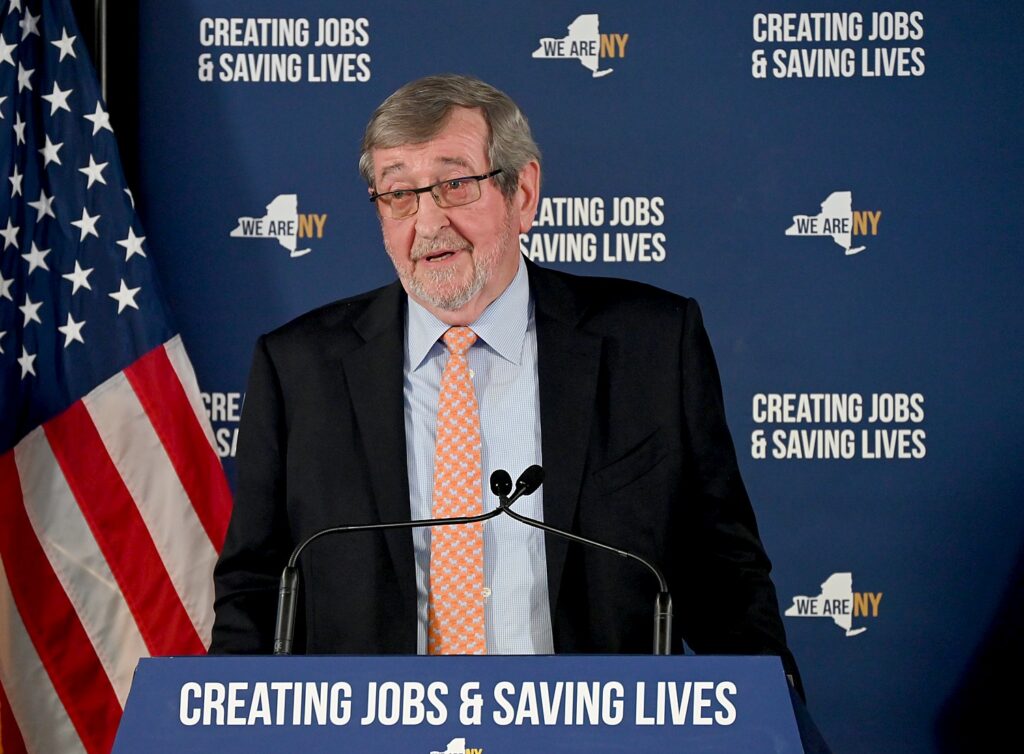
“This is an investment in life-saving technology. We will be doing things never done before, expand on what we think we can do, It’s also about prevention, not just treatment, and recovery. This is an investment in collaboration and partnerships, working across all research areas, the best minds, researchers, intellectuals, to work together to create a new future,” Dowling said. “Imagine what could happen. This is a legacy event.”
The setting of the new campus is ideal – in close proximity to two other Northwell campuses and the largest ambulatory cancer center in the region.
The Albanese Organization, Inc., a Long Island-based developer with more than 70 years of experience in managing public-private partnerships, was selected following a Request for Proposals issued in December 2023 to lead the comprehensive process to design, finance, build, market, tenant, and operate the Long Island Cell and Gene Therapy Center. “This selection ensures that the project will be executed from conception to operation with an experienced development team, leveraging Albanese’s extensive expertise in developing large life science innovation campuses,” the state said.
“The Albanese Organization and our development team are honored and excited to be designated by Empire State Development to enter into this public private partnership that will realize the Governor’s vision to create a ‘Hub of the Future’ for Cell and Gene Therapy in Lake Success, Long Island. This transformative development will serve as a significant catalyst for advancing cell therapy research, development, clinical manufacturing, and commercialization across the State that will lead to increased access to transformative, life-saving treatments. The Hub will also further amplify and expand the economic engine that is the life sciences industry within New York State, and specifically Long Island.”
“The New York BioGenesis Park represents a transformative investment in Long Island’s future and solidifies our region’s position at the forefront of biotechnology innovation,” stated Long Island Regional Economic Development Commission Co-Chairs Linda Armyn and Dr. Kimberly R. Cline said.”This visionary project not only promises to create high-quality jobs and drive economic growth, but it also establishes Long Island as a global hub for cell and gene therapy research and development. By leveraging our region’s world-class academic institutions, skilled workforce, and entrepreneurial spirit, New York BioGenesis Park will catalyze breakthroughs that will save lives and shape the future of healthcare.”
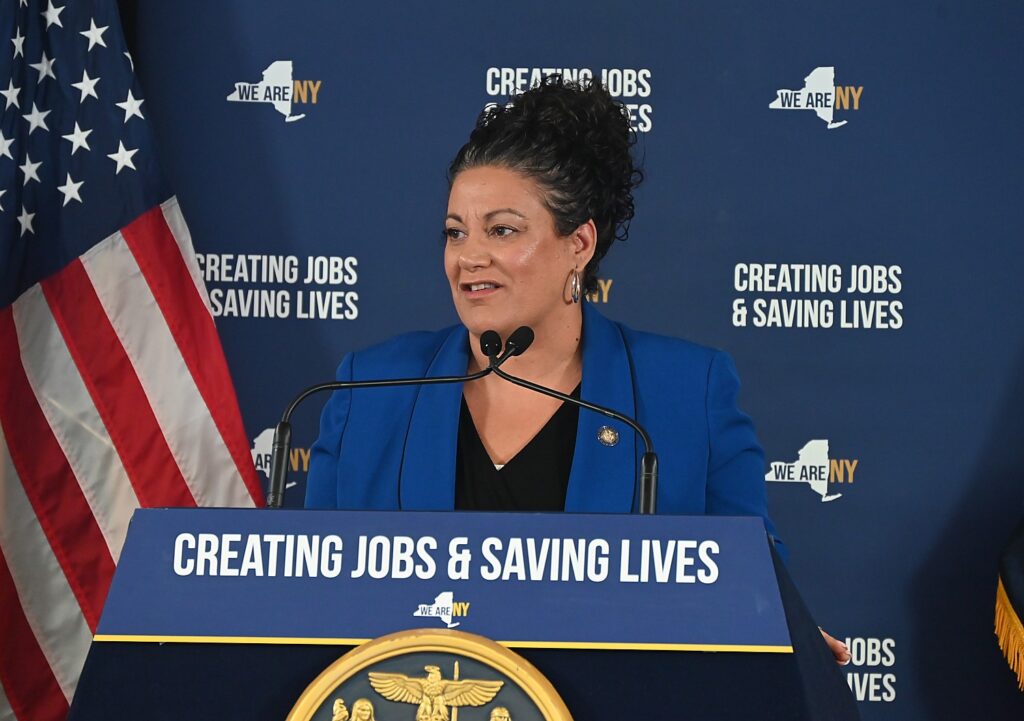
State Assemblywoman Gina Sillitti, who helped win the funding, said, “New York State’s $150 million investment in a gene therapy research hub at Lake Success is a transformative step in developing Long Island’s biotechnology sector. I thank Governor Hochul for championing this initiative, which will create hundreds of jobs and further solidify Long Island’s place as a national leader in cutting-edge medical research and treatments.”
“New York is already a leader in the science of making ‘living cures’ from our own cells,” Roswell Park Comprehensive Cancer Center President and CEO Candace S. Johnson, PhD said. “With these historic investments in the Roswell Park GMP Engineering & Cell Manufacturing Facility and New York BioGenesis Park, Governor Kathy Hochul and Empire State Development are making sure our teams are supported by an innovation infrastructure powerful enough to transform their curiosity into cures”
New York Blood Center Enterprises President and CEO Christopher D. Hillyer, MD said,“The creation of the Long Island Center for Cell and Gene Therapy represents a critical investment in the future of medicine. New York Blood Center Enterprises and Comprehensive Cell Solutions are extremely proud to be part of the team that will position New York as a global leader in life sciences, particularly in cell and gene therapy, offering new hope to patients facing diseases once thought untreatable.”
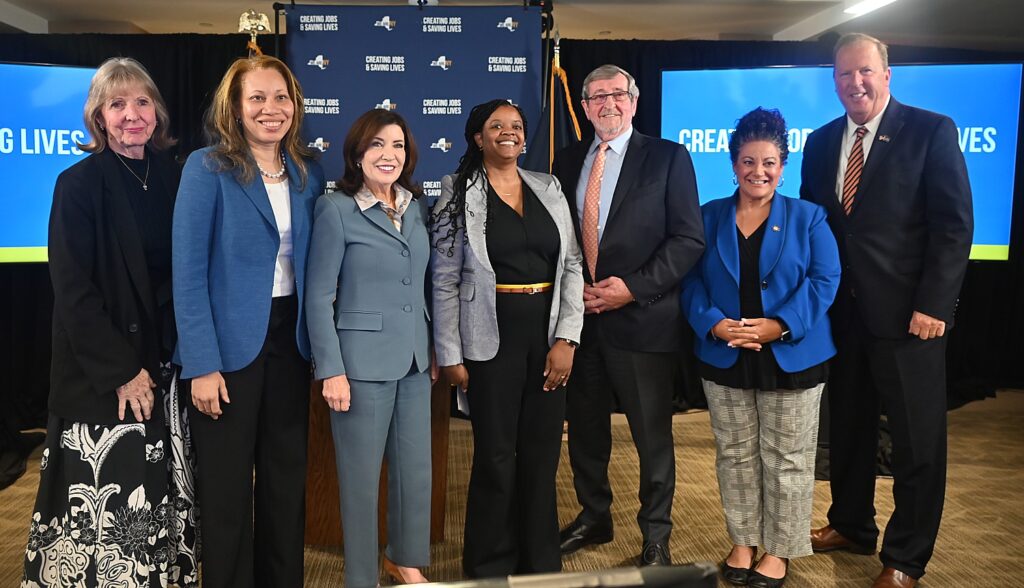
Cold Spring Harbor Laboratory President and CEO Bruce Stillman, PhD said, “The New York State cell and gene therapy initiative on Long Island will be a most welcome addition to the region’s biomedical research enterprise, and Cold Spring Harbor Laboratory looks forward to partnering with the CGT initiative. We thank Governor Hochul and Empire State Development for pioneering this exciting research expansion.”
The Long Island Cell and Gene Therapy Innovation Hub stands to serve as a cornerstone of New York’s $620 million Life Science Initiative. Aimed at establishing the state as a national leader in the broader life sciences industry—including biotechnology, pharmaceuticals, and medical technology—the initiative allocates $320 million for strategic programs to attract new technologies, promote investment in emerging fields, and stimulate life science business growth and employment statewide. This multifaceted approach seeks to spur the development of a world-class research cluster, enhance the state’s ability to commercialize groundbreaking research, and drive economic growth.
By solidifying New York’s position in life sciences innovation, the initiative advances Cell and Gene Therapy development and strengthens the state’s global competitiveness. Read New York State’s Life Science Initiative Strategic Plan here.
__________________________
© 2024 News & Photo Features Syndicate, a division of Workstyles, Inc. All rights reserved. For editorial feature and photo information, go to www.news-photos-features.com, email editor@news-photos-features.com. Blogging at www.dailykos.com/blogs/NewsPhotosFeatures. ‘Like’ us at facebook.com/NewsPhotoFeatures, Tweet @KarenBRubin Threads: @news_and_photo_features

